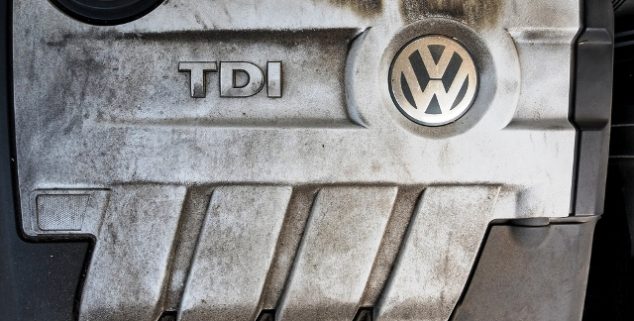News
California story: Tracking down VW fraud
 A top view of a VW diesel engine. (Photo: Shanti Hesse)
A top view of a VW diesel engine. (Photo: Shanti Hesse)The California Air Resources Board’s aggressive questioning of Volkswagen about emission test results led to the company admitting in 2015 that it used a “defeat device” designed to cover up diesel emissions that greatly exceeded legal limits.
The massive fraud case ultimately included a $14.7 billion settlement in 2016, $4.7 billion in civil and criminal fines and an executive-level shakeup. It dramatically underscored California’s role as a national and international air-quality watch dog.
“Here we have a huge multinational corporation — the biggest seller of automobiles in the world – engaging in a criminal conspiracy to intentionally and deliberately violate air pollution laws.” — Bill Magavern
Alberto Ayala, deputy executive officer of the California Air Resources Board, recalls that when news of the fraud came out, authorities from around the world contacted the agency thanking it for its work and asking advice on how to prevent the fraud from happening again.
Ayala said the agency has shared information with colleagues in Europe and would like to continue to keep the dialogue flowing.
“Not only California gets cleaner, better cars but (so do) other jurisdictions around the world,” he said.
Volkswagen used illegal software to cover up emissions in 600,000 Volkswagen, Audi and Porsche diesel cars sold in the United States out of 11 million with it worldwide.
“Volkswagen deeply regrets the behavior that gave rise to the diesel crisis,” the company said in a statement in March after it reached a settlement with the U.S. Department of Justice. “The agreements that we have reached with the U.S. government reflect our determination to address misconduct that went against all of the values Volkswagen holds so dear.”
EPA Administrator Scott Pruitt previously fought the agency’s efforts on clean air in several lawsuits and has worked closely with the fossil fuel industry.
California has a unique role in that it is the only state allowed to set tougher emissions standards for cars and trucks than the U. S. Environmental Protection Agency. About a dozen states have chosen to follow California’s lead in observing tougher standards.
Bill Magavern, policy director of the Coalition for Clean Air, said California’s leadership role is even more critical now since the Trump administration has taken charge at the federal level. “The US EPA is controlled by polluters,” he said. “It makes it even more important to be vigilant.”
EPA Administrator Scott Pruitt previously fought the agency’s efforts on clean air in several lawsuits and has worked closely with the fossil fuel industry.
Magavern said the California Air Resources Board’s long experience with regulating emissions gave it the expertise to uncover the Volkswagen fraud.
“Here we have a huge multinational corporation — the biggest seller of automobiles in the world – engaging in a criminal conspiracy to intentionally and deliberately violate air pollution laws,” he said. “It really shows that we cannot rely on companies to do the right thing. We need vigorous enforcement. When they’re caught, they need to be penalized severely.”
“California has a long and rich history in being on the vanguard in environment,” he said. “I don’t think that will change anytime soon.” — Kip Lipper
Since Volkswagen’s fraud came to light, other allegations of deception have surfaced with other auto companies. Fiat Chrysler Automobile has been in talks with the Department of Justice about settling an investigation into similar reports that it may be using illegal software to evade emissions tests, though the fallout is not expected to be as severe as that of Volkswagen. The EPA accused the company of violating clean air rules in about 100,000 Dodge Ram and Jeep Grand Cherokee vehicles.
Meanwhile, Germany is looking into allegations of whether Daimler, the automaker that produces Mercedes cars, evaded emissions standards.
Magavern believes California should do even more to monitor air quality, like putting in more air monitors to get accurate data about the quality of air residents are breathing. He thinks California residents support such tough standards.
Kip Lipper, the chief policy adviser for energy and environment for the state Senate leadership, expects California to continue to set the bar high for environmental protections.
“California has a long and rich history in being on the vanguard in environment,” he said. “I don’t think that will change anytime soon.”
He pointed out that air quality is important to Californians of all backgrounds. “Clean air has been a bipartisan issue in California for many decades,” he said. “The impacts on clean air don’t fall on partisan lines. They affect Republican areas just as much as Democratic areas.”
Ayala said the Volkswagen fraud case shows that regulations and mandates are important for consumer protection.
“This is one case that shows public dollars in good regulatory work pay dividends.”
Want to see more stories like this? Sign up for The Roundup, the free daily newsletter about California politics from the editors of Capitol Weekly. Stay up to date on the news you need to know.
Sign up below, then look for a confirmation email in your inbox.

Leave a Reply